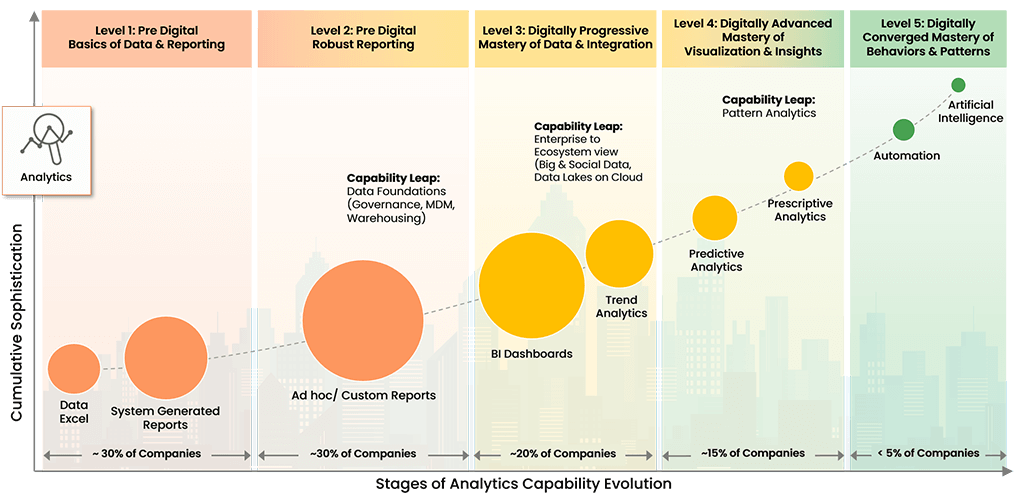Disruptive Technologies in the Manufacturing Industry
With manufacturers trying to keep pace with consumer demand for high-quality products, companies must adopt data-driven technologies. This includes leveraging artificial intelligence (AI), augmented and virtual reality (AR and VR), 3D printing, and industrial internet of things (IIoT).
The areas of progress in conjunction with foundations of these technologies will improve production process through tracking and automation, while focusing on increasing throughput as well as output. Keep in mind, their use only scales when a strong technology foundation is laid — otherwise, new technology investments will be limited to specific initiatives.
Only 7% of Companies Are Delivering on Their Transformational Initiatives
Our research has shown that 30% of companies will fail to survive this decade due to an inability to evolve digitally. To address this negative trend, we have developed the Digital Enterprise Evolution Model™ (DEEM).
Digital Enterprise Evolution Model™

Copyright © 2022 Trianz
DEEM allows our clients to recognize digital evolution patterns, implement benchmarking and prioritization strategies, and initiate application management protocols to satisfy stakeholder and market requirements.
L'Internet industriel des objets (IIoT) n'est toujours pas une priorité pour l'industrie manufacturière. Seules 8 % des organisations du secteur manufacturier ne considèrent pas le cloud pour les applications IIoT comme une priorité, et seules 19 % des organisations en sont au stade de l'analyse de rentabilisation/justification.
Avec une demande accrue de personnalisation, des attentes croissantes des clients et une complexité croissante de la chaîne d'approvisionnement internationale, les fabricants doivent examiner sérieusement l'IIoT pour trouver des moyens plus innovants de rester compétitifs.
L'IIoT peut aider les fabricants à maximiser leur valeur commerciale grâce à la réduction des coûts, à la réduction des délais de mise sur le marché, à la disponibilité de la production, à l'amélioration de la sécurité et à la personnalisation accrue des opérations de fabrication. En exploitant les données de l'IIoT, les fabricants peuvent améliorer la prévision de la demande, acquérir une meilleure compréhension des processus de la chaîne d'approvisionnement et améliorer l'expérience globale du client.
Gestion du capital humain (HCM) dans les entreprises manufacturières
Les dirigeants de l’industrie manufacturière prévoient d’importants investissements futurs dans l’analyse avancée pour la gestion des services d’approvisionnement et le capital humain. Si la plupart des transformations numériques dans ces deux groupes sont des réactions à des actions concurrentielles ou axées sur les clients, l’analyse prédictive déterminera comment, quand et dans quelle mesure la transformation à venir sera nécessaire.
En adoptant des plateformes de gestion du capital humain basées sur le cloud pour fournir des analyses, les fabricants pourront non seulement améliorer l'expérience des employés, mais également tirer parti des mesures opérationnelles pour aider les parties prenantes à mieux comprendre les contributions des employés.
Cela aidera les fabricants à prendre conscience de l’urgence de renforcer les compétences de leur personnel et de combler le déficit de compétences. En outre, les dirigeants reconnaîtront la nécessité de transformer les fonctions d’apprentissage des employés et de créer de nouvelles capacités pour attirer, intégrer et fidéliser les employés.
Découvrez la différence Trianz
Trianz permet des transformations numériques grâce à des stratégies efficaces et une excellente exécution. En collaboration avec les dirigeants d'entreprise et les dirigeants technologiques, nous aidons à formuler et à exécuter des stratégies opérationnelles pour atteindre les résultats commerciaux escomptés en apportant le meilleur du conseil, des expériences technologiques et des modèles d'exécution.
Forts de nos connaissances, de nos recherches et de nos perspectives, nous permettons à nos clients de transformer leurs écosystèmes commerciaux et d'atteindre des performances supérieures en tirant parti des paradigmes d'infrastructure, de cloud, d'analyse, de numérique et de sécurité. Contactez-nous pour nous contacter ou en savoir plus.



















